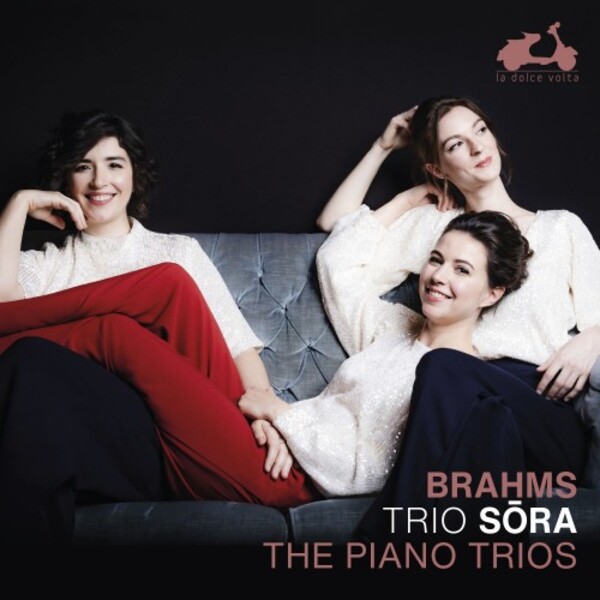BRAHMS Piano Trios (Trio Sõra)
View record and artist detailsRecord and Artist Details
Genre:
Chamber
Label: La Dolce Volta
Magazine Review Date: 06/2024
Media Format: CD or Download
Media Runtime: 114
Mastering:
DDD
Catalogue Number: LDV132

Tracks:
| Composition | Artist Credit |
|---|---|
| Piano Trio No. 1 |
Johannes Brahms, Composer
Trio Sora |
| Piano Trio No. 2 |
Johannes Brahms, Composer
Trio Sora |
| Piano Trio No. 3 |
Johannes Brahms, Composer
Trio Sora |
| (5) Lieder, Movement: No. 4, Wiegenlied (wds. Scherer) |
Johannes Brahms, Composer
Trio Sora |
Author: Andrew Farach-Colton
I thoroughly enjoyed Trio Sōra’s nimble, clear-textured traversal of Beethoven’s six piano trios (Naïve, 12/20), although I found a few of their tempo choices disconcertingly fast. There are some unusually fleet tempos in their impressive new set of Brahms’s trios, too, although nothing quite as daring. The Allegro giocoso finale of Op 87, for example, is just a hair faster than, say, the Beaux Arts Trio in their second recording (Philips, 1/88), yet it’s enough of a difference that the music sounds more nervoso than giocoso. Then there’s the scherzo-like Presto non assai of Op 101, which moves here like mercury on a marble tabletop. I’d argue it’s a full-on Presto, yet it works because they phrase so generously that any sense of metre or bar line is swept away.
Technically, Trio Sōra are extremely impressive. Their ensemble has Boulezian precision, the strings’ intonation is close to faultless and they clearly take great care over matters of articulation and balance (the latter aided, I’m sure, by the label’s superb engineering). I especially appreciate how sensitive they are not only to Brahms’s markings but also to the music’s changing harmonic colours. Listen at 1'18" in the first movement of Op 87 (offered here in its revised form), where they take the dolce marking very much to heart. Here and elsewhere they’re not afraid to let the music breathe when it needs to, as at 2'52" in the opening Allegro con brio of Op 8. Perhaps they hold back a bit too much at that movement’s end – Brahms writes in tempo ma sempre sostenuto and the Sōra’s wistful reverie means that they have to suddenly lurch forwards for the final bars – but this in no way spoils a reading that is remarkably well considered in every other respect.
As a bonus to the three standard piano trios, the Sōra also give us Brahms’s alternative version of his Horn Trio in which the cello takes the horn part. As a kind of recompense for what’s lost in atmosphere by bringing the music indoors and out of a sylvan setting, as it were, is an enhanced sense of intimacy, and these musicians fully capitalise on this. I love their heartfelt surging phrases at 3'20" in the opening Andante and how rapturously they render the passage leading to the coda (start at 6'55"), as well as how the violin and cello often sound like a single instrument in much of the Adagio mesto. A tender yet unaffected reading of the famous ‘Wiegenlied’ (in an arrangement by Mathieu Herzog, former viola player of the Ébène Quartet) makes a sweet little treat of an encore.
Discover the world's largest classical music catalogue with Presto Music.

Gramophone Digital Club
- Digital Edition
- Digital Archive
- Reviews Database
- Full website access
From £8.75 / month
Subscribe
Gramophone Full Club
- Print Edition
- Digital Edition
- Digital Archive
- Reviews Database
- Full website access
From £11.00 / month
Subscribe
If you are a library, university or other organisation that would be interested in an institutional subscription to Gramophone please click here for further information.




